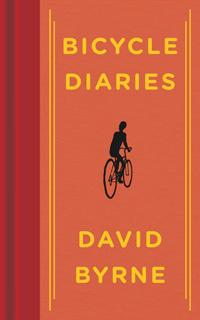Packed House Applauds Bicycle Diarist Byrne and Friends
What was billed as a book reading by famed Talking Heads frontman David Byrne on Tuesday evening took on the air of a teach-in on cities and bicycles, with Byrne and fellow cycling superstars Janette Sadik-Khan and Paul Steely White taking turns extolling New York City’s blooming bicycle infrastructure before a packed house at the Union Square Barnes & Noble.
 The occasion was publication of Bicycle Diaries, Byrne’s idiosyncratic meditation on cities, urban form, culture and fashion, distilled through his three decades as touring musician and bicycle tourist. In the introduction, Byrne writes of navigating New York and other cities a velo, as both a smart way of getting around and a means to a fresh vantage point:
The occasion was publication of Bicycle Diaries, Byrne’s idiosyncratic meditation on cities, urban form, culture and fashion, distilled through his three decades as touring musician and bicycle tourist. In the introduction, Byrne writes of navigating New York and other cities a velo, as both a smart way of getting around and a means to a fresh vantage point:
This point of view — faster than a walk, slower than a train, often slightly higher than a person — became my panoramic window on much of the world over the last thirty years — and it still is.
Byrne "came out" as an urban bike advocate a few years ago
and periodically does events with Transportation Alternatives. Over the years,
too, his artistic focus has branched out from art-rock innovator to world-music
collaborator and design philosopher. Inviting DOT Commissioner Sadik-Khan and
TA head honcho White on stage allowed Byrne to serve his twin impulses of
advocate and curator.
Byrne’s presentation drew on his mordant photos of dreary
cityscapes drained of human activity. “Most of America is like this,” he intoned over scenes of empty boulevards and ghoulish strip malls, mixed with design images from brutalist architect Le Corbusier (“We must
kill the streets”), which Byrne likened to termite mounds. “We’re not termites,” he insisted, invoking livable streets deity Jane Jacobs before turning over the mic to the professionals.
Sadik-Khan’s affectionately titled slide show, “NYC’s
Bicycle Diaries, 2007-2009,” offered a stirring response to Byrne’s plea to
city shapers to stop “separating everyone in separate pockets.” Insisting that streets be
“places of social exchange” as well as of movement, Sadik-Khan located cycling
infrastructure in a larger context of World Class
Streets that includes walkability, better transit and fewer cars. Her
parade of heartening statistics on new bike lane miles, burgeoning cycling
volumes, and fewer pedestrian injuries on bike-laned streets flew by too
quickly to jot down. What lingers is Sadik-Khan’s passionate regard for cycling
as key to a more humane city, and her zeal to grow and defend all DOT has
wrought in her two-and-a-half years at the helm.
White picked up Byrne’s riff in Bicycle Diaries about “the aura of uncoolness and the danger” of NYC
cycling in the punk era, and traced cycle culture’s progression from “freak” to “geek” to today’s nascent “chic.” With cycling
finally entering the mainstream, it’s time, White declared, for cyclists to retire
their outlaw persona and adhere to the pedestrian-friendly street code in TA’s Biking Rules. He also exhorted the crowd to
defend the embattled Grand Street bike lane against grandstanding politicians: “Call
[Comptroller and Democratic mayoral candidate] Bill Thompson (212-608-6555) and
tell him that safety is not negotiable on NYC streets.”
The audience questions — all earnest and mostly from women —
brought out the visionary in Byrne. (From the next seat, my middle-school son
made me promise not to sing out, “My building bike lane has every convenience / It’s gonna
make life easy for me.”) To a recent arrival from Amsterdam (“I’m really amazed
that in a short period of time, so much positive change has been made in the
City of New York… What’s to prevent a new mayor from taking that away?”), Byrne
replied, “If we can get a third of the people biking to work, like in Amsterdam and Copenhagen, it would be pretty hard to turn that around.” To a questioner worn down by internecine cyclist-pedestrian conflict, Byrne offered this: “We’ve gone through eight or ten years of a bully culture — on Wall Street, in politics. I think we’re turning a corner.”